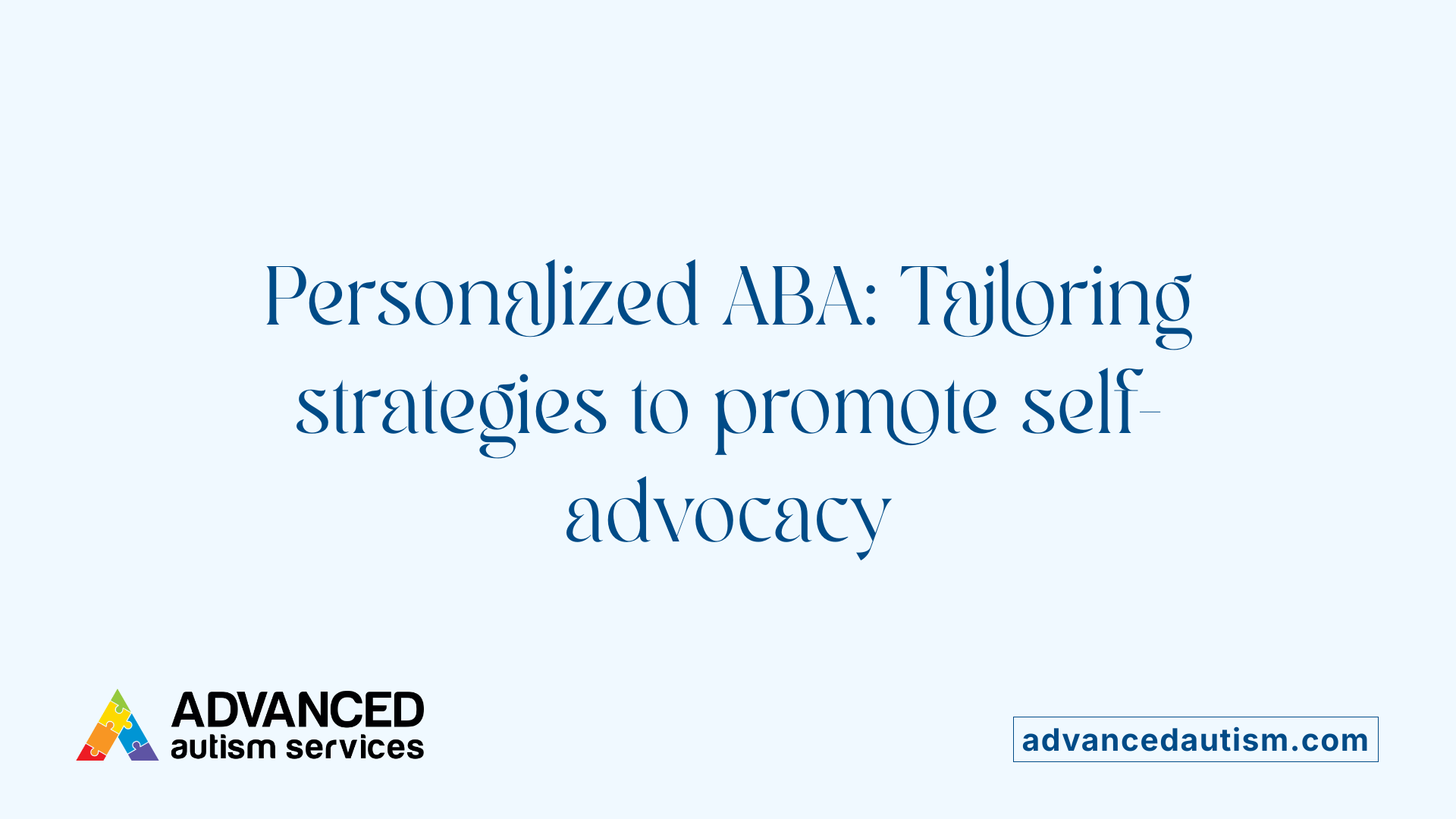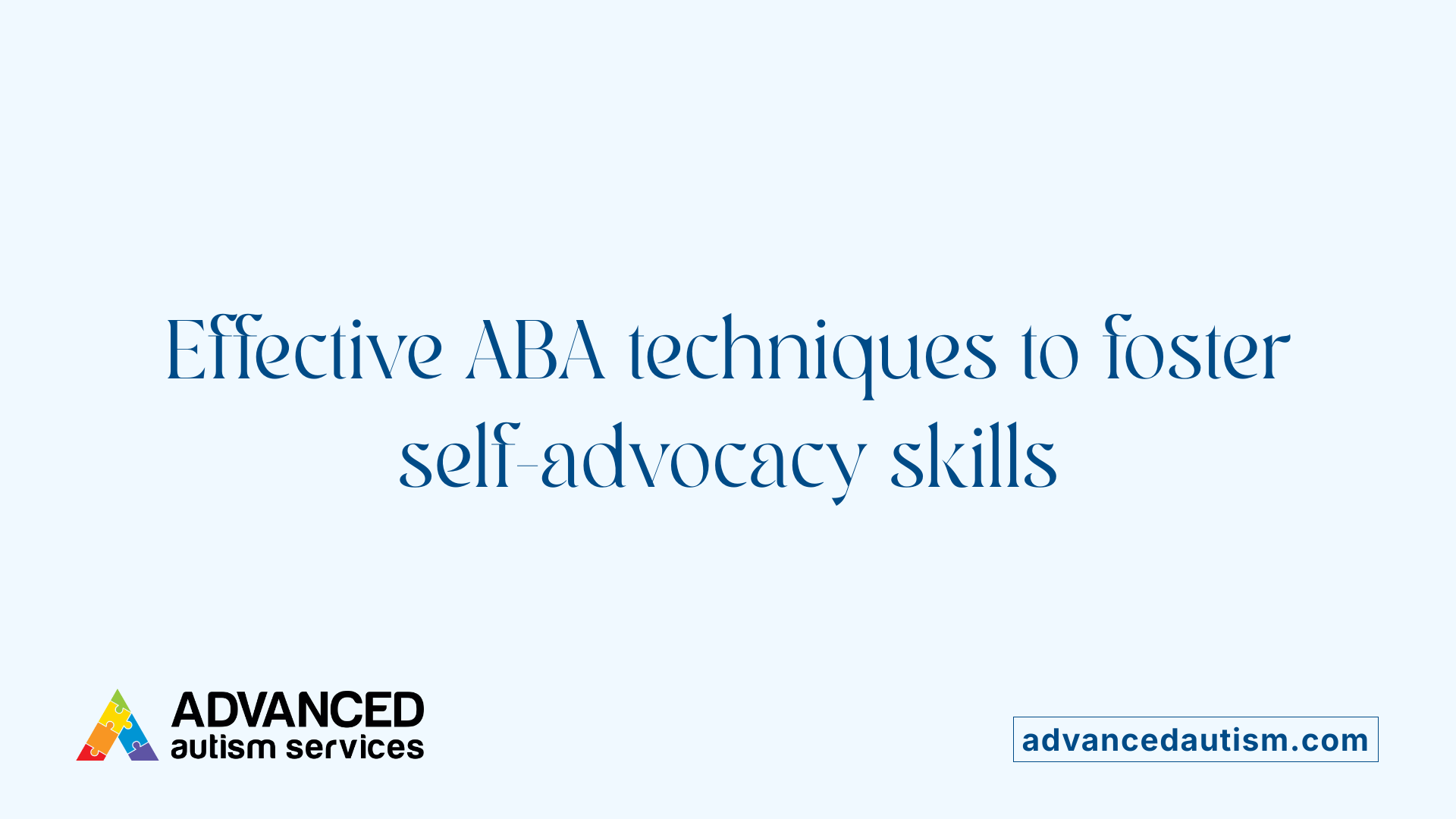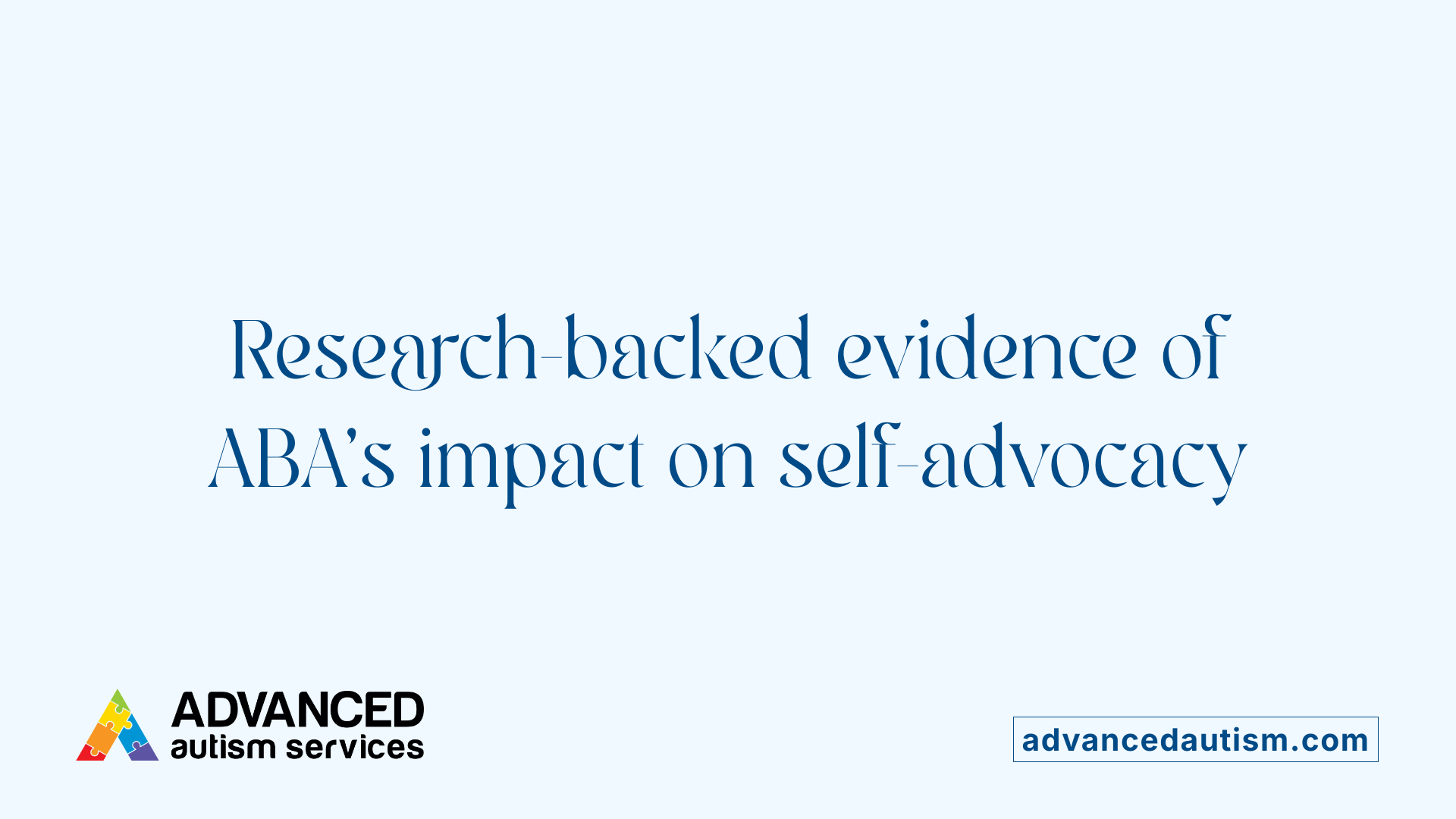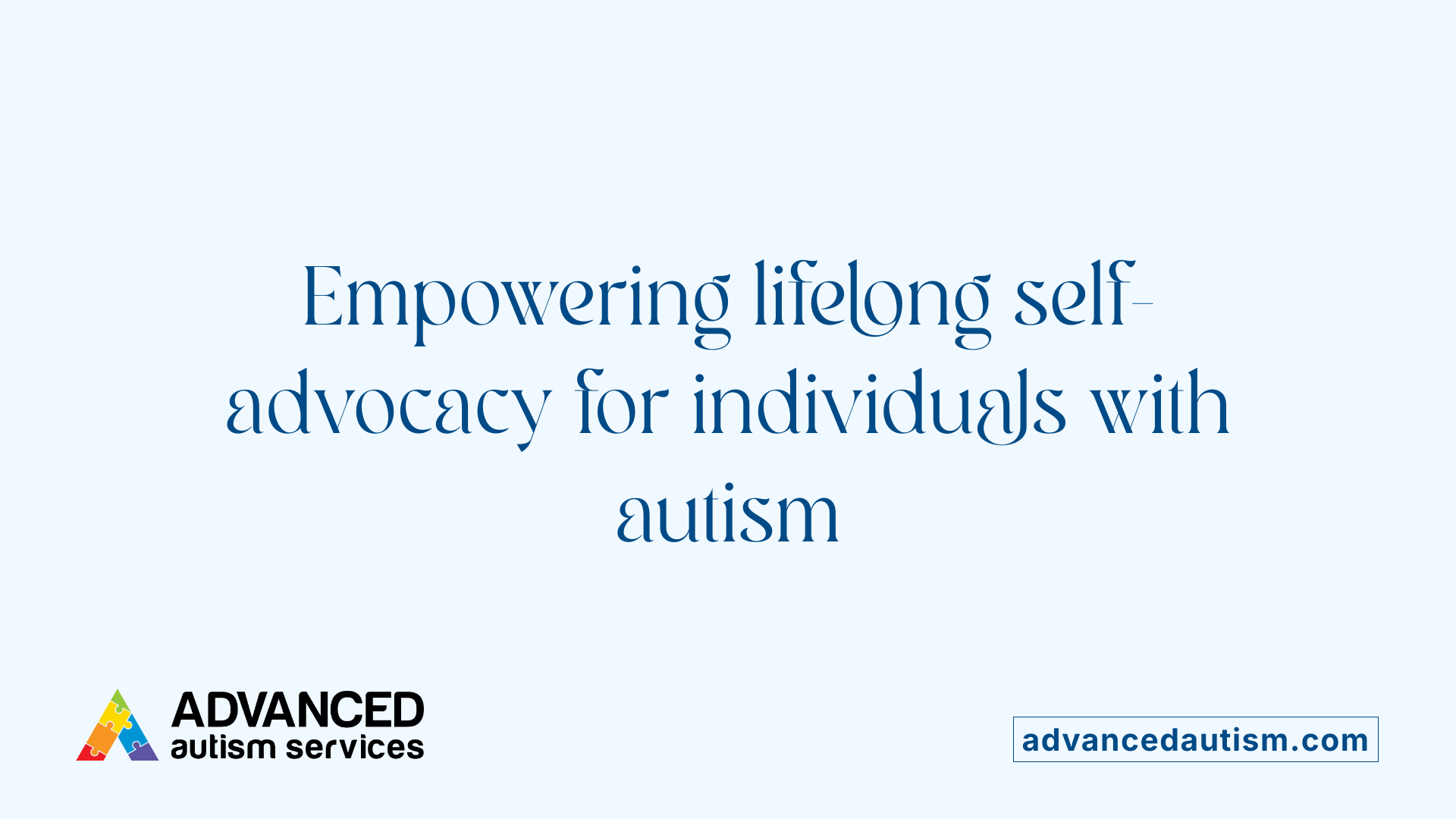Understanding ABA's Impact on Self-Advocacy
Applied Behavior Analysis (ABA) therapy plays an integral role in empowering individuals with autism to develop essential self-advocacy skills. By focusing on tailored interventions, ABA helps individuals articulate their needs, participate in decision-making, and foster independence across various life domains. This article explores how personalized ABA programs and strategic methodologies support self-advocacy, highlighting research evidence, practical interventions, and the significance of fostering these skills from early childhood through adulthood.
The Importance of Personalized ABA Programs in Cultivating Self-Advocacy

How important are personalized ABA programs in fostering self-advocacy abilities?
Individualized ABA programs are vital for developing self-advocacy skills in children with autism. These tailored interventions recognize that each child has a unique set of strengths, preferences, and challenges. By customizing goals and strategies, therapists can focus on teaching children how to communicate their needs, make decisions, and assert their interests more effectively.
Personalized approaches also align with the principles of neurodiversity, which respect and celebrate varied ways of thinking and feeling. Instead of trying to eliminate behaviors, these programs emphasize supporting the child's independence and self-identity. This might include helping children understand their diagnosis, practice asking for help, and advocate for accommodations they require.
Engaging children early in goal-setting and involving them actively in their learning process fosters confidence. When children are part of choosing what to work on, they gain a sense of control and ownership, key elements in self-advocacy.
Moreover, individualized ABA often incorporates a variety of teaching methods like role-playing, visual supports, and social narratives, which are effective in strengthening communication and self-awareness.
Ultimately, personalized ABA programs not only help in skill development but also promote a positive self-image and independence. These qualities are essential for children to navigate social settings, educational environments, and later, adult life confidently.
| Aspect | Focus | Benefits |
|---|---|---|
| Tailoring interventions | To individual needs | More effective skill acquisition and motivation |
| Goal setting | Involving children | Builds confidence and self-determination |
| Principles aligned | With neurodiversity | Respect and empower individual differences |
| Outcomes | Independence and self-advocacy | Enhances quality of life and social participation |
Strategies and Techniques in ABA for Promoting Self-Advocacy
 ABA (Applied Behavior Analysis) employs several targeted strategies to help children with autism develop self-advocacy skills. These methods focus on making children more independent, confident, and capable of expressing their needs and preferences.
ABA (Applied Behavior Analysis) employs several targeted strategies to help children with autism develop self-advocacy skills. These methods focus on making children more independent, confident, and capable of expressing their needs and preferences.
One of the primary approaches is functional communication training (FCT). FCT teaches children alternative ways to communicate their needs, whether through speech, signing, or using assistive communication devices. This enables them to ask for help, express discomfort, or request accommodations effectively.
Role-playing and social narratives are also widely used. Role-playing allows children to practice real-life scenarios, such as advocating during an IEP meeting or politely declining certain social invitations. Social narratives provide stories that help children understand social expectations and how to navigate situations confidently.
Task analysis and visual supports serve as foundational tools in ABA to foster independence. Breakdowns of complex tasks into smaller, manageable steps, combined with visual cues like charts and pictures, enable children to learn routines, make decisions, and advocate for themselves effectively.
Reinforcing autonomous behaviors through positive reinforcement fosters a sense of empowerment. When children successfully communicate or make decisions, they receive praise or tangible rewards, prompting continued efforts toward independence.
Lastly, the use of technology and communication tools has become a significant component. Apps on tablets, computerized communication boards, and online resources help children learn to express themselves beyond traditional means, facilitating self-advocacy in diverse environments.
Overall, these strategies collectively support children in becoming confident self-advocates, encouraging them to participate actively in their lives, from school decisions to social interactions.
Enhancing Social, Communication, and Functional Skills through ABA
How does ABA therapy help improve social skills, communication, and real-world functioning necessary for self-advocacy?
ABA therapy plays a vital role in developing essential skills that enable children with autism to navigate their social environments confidently. At its core, ABA targets foundational behaviors such as eye contact, joint attention, and expressive language. By using evidence-based strategies like positive reinforcement, modeling, and naturalistic teaching, ABA helps children learn and practice these skills in engaging and meaningful ways.
Early intervention is critical. When therapies are introduced at a young age, children are better able to generalize learned behaviors across various settings like home, school, and community environments. Parental involvement through training and tools such as video modeling enhances skill acquisition and consistency. Video modeling, in particular, allows children to view and imitate desired behaviors, making learning more accessible and effective.
Communication skills are central to self-advocacy. ABA programs often incorporate techniques such as Verbal Behavior Therapy, which focuses on functional communication, and utilize augmentative devices for non-verbal children. These approaches empower children to express their needs, ask questions, and participate actively in conversations.
As children acquire these social and communication skills, they become more capable of advocating for themselves. They can better express their preferences, negotiate, and make decisions about their daily lives. This enhances their independence and confidence in social situations.
Furthermore, ABA's personalized approach ensures that interventions are tailored to each child's unique strengths and challenges. This customization supports meaningful skill development, fostering not only social competence but also self-advocacy and overall functioning.
In summary, ABA therapy improves social participation and communication, laying the foundation for children with autism to advocate for their needs and transition smoothly into adult roles, increasing their independence and quality of life.
Developing Independence, Confidence, and Leadership with ABA
What role does ABA therapy play in developing independence, confidence, and leadership skills in individuals with autism?
ABA therapy is a powerful tool in helping children and adolescents with autism build essential life skills. It emphasizes teaching functional, social, and communication skills that serve as the foundation for independence.
Through evidence-based techniques such as positive reinforcement, ABA encourages behavior modifications that foster language development, social interaction, and attentiveness. These improvements translate into greater self-reliance and confidence as individuals learn to navigate their environment more effectively.
ABA also targets critical qualities associated with leadership, including problem-solving, decision-making, and flexibility. By setting personalized goals and systematically reinforcing each achievement, ABA helps individuals become more autonomous and capable of taking on leadership roles.
For example, traits like perseverance and analytical thinking are nurtured through structured interventions such as role-playing and task analysis. These strategies empower individuals to handle challenges independently, boosting their confidence and readiness to lead.
Additionally, success stories of individuals like Temple Grandin highlight how ABA-driven skill development can lead to leadership in various fields.
Overall, ABA’s tailored approach and focus on behavioral understanding help individuals with autism develop the confidence and independence necessary for leadership. It lays a strong groundwork for them to participate actively and confidently in their communities, fostering personal growth and societal inclusion.
Evidence Supporting ABA’s Effectiveness in Enhancing Self-Advocacy
 Research findings and case studies demonstrate that ABA therapy significantly improves self-advocacy skills in individuals with autism.
Research findings and case studies demonstrate that ABA therapy significantly improves self-advocacy skills in individuals with autism.
Numerous studies have documented that ABA interventions can boost social communication skills, foster independence, and promote self-determination—all crucial for effective self-advocacy. For instance, targeted ABA programs that include explicit teaching of self-advocacy behaviors—such as requesting needs, negotiating, and understanding personal rights—have shown to increase autonomy in academic, social, and healthcare environments.
Case studies highlight children and teenagers who, after receiving ABA-based self-advocacy training, become more confident in expressing their needs and participating actively in decision-making processes. These improvements in communication and self-confidence often lead to better transition outcomes, such as successful inclusion in community activities or greater participation in IEP meetings.
Enhancing self-advocacy through ABA not only supports individual independence but also positively influences self-concept. Autistic individuals report feeling more empowered and capable when they gain skills to advocate for themselves, fostering higher self-esteem and community engagement.
An important aspect of the evidence is the emphasis on strength-based and community-centered approaches. These methods respect neurodiversity and focus on personal strengths and interests, making self-advocacy teaching more relevant and effective.
Overall, research indicates that ABA can support the development of self-advocacy by improving communication, decision-making, and social participation skills, ultimately promoting a more autonomous and confident life for individuals with autism. When aligned with principles of self-determination, ABA fosters resilience and enhances quality of life.
| Evidence Area | Findings | Implications |
|---|---|---|
| Social Communication | Improved requesting and negotiation skills | Better self-advocacy in educational and social settings |
| Independence & Skills | Increased participation in community and daily activities | Greater ability to manage personal needs and environments |
| Self-Concept & Empowerment | Enhanced self-esteem and self-awareness | More confident self-advocates and active community members |
| Approach & Methodology | Use of strength-based, client-centered strategies | Ethical practice aligned with neurodiversity principles |
For further insights, searching "Research evidence of ABA in supporting self-advocacy in autism" can provide detailed studies and reviews supporting this approach.
The Lifelong Nature of Self-Advocacy and Continuing Support

Why is self-advocacy important for children, adolescents, and adults with autism?
Self-advocacy is vital across all stages of life for individuals with autism. It enables them to effectively communicate their needs, preferences, and rights, which is fundamental for independence and social integration.
For children, early development of self-advocacy skills helps them understand their diagnosis and express needs, fostering confidence and reducing frustrations. As they grow into adolescents and adults, these skills become essential for managing their education, employment, health, and social relationships.
Teaching self-advocacy early supports a smooth transition into adulthood, where navigating complex environments requires assertiveness and self-awareness. This ongoing skill development promotes autonomy, allowing individuals to access necessary accommodations, participate actively in community, and make decisions that reflect their personal desires.
Transition from childhood to adulthood
Transitioning from childhood to adulthood involves increasingly sophisticated self-advocacy abilities. During this period, individuals learn to handle more complex social and professional settings.
Effective supports include involving them in planning processes such as Individualized Education Programs (IEPs), encouraging them to express preferences, and teaching them about their rights under laws like the ADA and IDEA.
As they mature, individuals learn to manage their health, finances, and personal relationships, emphasizing the importance of self-determination and confidence.
Support strategies for different life stages
Support strategies evolve to match developmental needs. For younger children, this might include role-playing, social stories, and involvement in goal-setting activities.
In adolescence, focus shifts to practicing decision-making, understanding rights, and communicating needs in more elaborate ways.
As adults, interventions include training in workplace communication, self-management practices, and understanding legal rights. For seniors, supports include managing health issues, navigating healthcare systems, and planning for independence.
Across all stages, explicit teaching, real-world practice, and supportive environments are crucial.
Respect for autonomy and rights
Respecting an individual's autonomy means honoring their ability to make choices, respecting privacy, and supporting their right to take risks.
Giving opportunities to make decisions, such as selecting daily routines, choosing social activities, or advocating for oneself in healthcare settings, fosters confidence.
Supporting self-advocacy also involves educating about legal rights, encouraging the use of communication tools, and respecting personal boundaries.
Overall, empowering individuals with autism to be active participants in their lives enhances their well-being and societal inclusion. Ensuring ongoing support and understanding their evolving needs are fundamental to fostering a fulfilling and autonomous life for individuals with autism.
Supporting Self-Advocacy Through Ethical and Personalized Interventions
Empowering individuals with autism to advocate for themselves is a cornerstone of supportive and ethical ABA practices. By incorporating personalized strategies, fostering confidence, teaching communication and decision-making skills, and respecting individual rights, ABA therapy can significantly enhance self-advocacy capabilities. As research continues to demonstrate the effectiveness of these approaches, it is vital for practitioners, families, and communities to collaborate in creating environments that promote independence and lifelong self-determination. Ultimately, a person-centered, strength-based approach ensures that self-advocacy becomes a natural and empowering part of every individual’s journey toward autonomy and full societal participation.
References
- The Controversy Around ABA - Child Mind Institute
- The Importance of Self-Advocacy - The Autism Helper
- Help Your Autistic Child Self-Advocate - Autism Centre For Kids
- The Vital Importance of ABA Therapy and Advocacy in Autism Support
- Help Children Learn How to Self Advocate
- Teaching Your Child Self-Advocacy - Autism Speaks
- The Top 10 Reasons Children With Autism Deserve ABA - PMC
- Benefits of caregiver involvement in ABA Therapy programs



